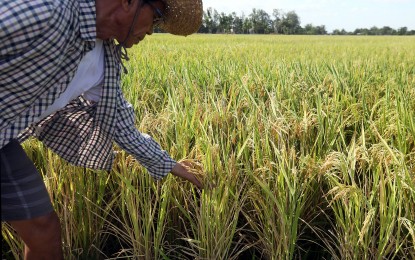
(PNA file photo)
MANILA – The National Economic and Development Authority (NEDA) and the Department of Trade and Industry (DTI) are making their final push for the Senate to concur on the Regional Comprehensive Economic Partnership (RCEP) during this administration.
This, as the agencies once again briefed senators on Monday on the positive gains for the country in joining the RCEP.
The Senate’s concurrence is the last step before the country can deposit its instrument of ratification.
Both NEDA and DTI reiterated that lawmakers should look at the overall impact on the economy with the country’s participation in RCEP, and not only on the concerns of a particular sector.
Concerns raised by some groups in the agriculture sector in the Senate are seen to be slowing down the upper house’s concurrence on the regional free trade agreement (FTA), as they fear that the trade deal will flood the country with cheaper imported commodities.
The two agencies, especially DTI, have been allaying fears of some groups in the agriculture sector, noting that the RCEP is not a threat to the local sector.
DTI Assistant Secretary Allan Gepty, the country’s lead negotiator to RCEP, said the government has ensured that the interest of the local agriculture sector is protected.
Gepty said that during the negotiations, the country excluded sensitive agricultural products for liberalization.
“In RCEP, basically we have only liberalized 33 agricultural tariff lines. Of these 33 tariff lines, 17 are raw materials, 8 are inputs and only 8 tariff lines are final goods. This accounts for only 1.9 percent of total agricultural tariff lines and even less than 1 percent of the country’s total imports. This is very minimal compared to the huge benefits that the whole economy will gain which include the agriculture sector, industry, services, and investments,” Gepty said.
For his part, Socioeconomic Planning Secretary and NEDA Director General Karl Kendrick Chua said RCEP can be ratified while the government strengthens its support to the agriculture sector.
“We will help the agriculture sector be competitive and productive because that is the foundation of our structural transformation to become a prosperous country. But not at the expense of all the other sectors that also need our support. So, what we propose is to do things in parallel: ratify the RCEP but also help the agriculture sector become more competitive,” Chua said.
During the earlier Senate hearings on RCEP, Philippine Institute for Development Studies (PIDS) research fellow Francis Mark Quimba said the country could miss a 2-percent growth in the gross domestic product (GDP) if it will not join the regional trade deal.
While other countries have ratified and are enjoying the benefits of the RCEP, the Philippines is also expected to experience a 0.26-percent decline in GDP.
“RCEP is beyond liberalization. Because of the ASEAN and the ASEAN+1 FTAs, we already have a high rate of liberalization, we are already at 85 to 95 percent. Joining RCEP just means increasing it by three points more. Delaying RCEP means losing opportunities to bring our products to other countries with lower tariffs and losing these markets, as well as other opportunities opened by RCEP in areas such as services, investment, MSMEs, e-commerce, for Filipino services exporters and skilled professionals,” DTI Secretary Ramon Lopez said.
Of the 15 signatory countries in the RCEP, only the Philippines and Indonesia have yet to deposit their instrument of ratification.
The Philippines will start enjoying the benefits of RCEP 60 days after depositing the ratification instrument. (PNA)
